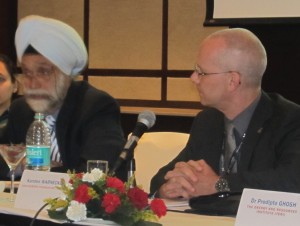ASEF Journalists’ Colloquium in India focuses on sustainable development
Story and photos by Cambodia New and New Youth

Delhi-NCR, India (10 November, 2013): Journalists and media professionals from Asia and Europe gathered at the 9th ASEF (Asia-Europe Foundation) Journalists’ Colloquium this week in Delhi National Capital Region (NCR) – India’s largest and the world’s second largest home with more than 22 million population –to discuss how they can report to help their governments with environment, sustainable development, and poverty reduction.
The ASEF Journalists’ Colloquium focuses on “Media and the Green Agenda: Reporting on Sustainable Development in Asia and Europe”. The Colloquium is organised in conjunction with the 11th ASEM Foreign Ministers’ Meetings to be held from 11-12 November 2013 in New Delhi where ASEF journalist participants are also joining.
Navtej Sarna, Additional Secretary of India’s Ministry of External Affairs, said the topic is really crucial for journalists to report for poverty reduction and economic growth. The role of media becomes critical to report on the issue to the public while it is a huge challenge in climate change and sustainable development for not only in Asia and Europe but also the whole world, Sarna said in his opening remarks at the 9th ASEF Journalists’ Colloquium on 10 November – supported by Konrad Adenauer Stiftung (KAS), World International Property Organization (WIPO), The Energy and Resources Institute (TERI), European Journalism Center (EJC).
Speaking in welcoming remarks at the Colloquium, Karsten Wernecke, ASEF Deputy Executive Director, said the Colloquium focuses on the challenges for the media in reporting on sustainable development, in particular the looming expiry of the MDGs in 2015 and its intended successor, Sustainable Development Goals (SDGs), as well as the areas of energy, green growth and economy, and poverty reduction.
As the media professionals from national and regional levels, he said, the Colloquium also provides an opportunity for journalists to come together and share their knowledge, experiences and perspectives with each other and build up their network for the future work in reporting on specific thematic issues such as sustainable development and environment, economy and society, and other themes aligned with the ASEM agenda more interesting, more effectively and more powerful.
Three journalists – one from Cambodia, one from Brunei, and another from India – are supported by the Asian regional KAS based in Singapore and the rest are from Australia, Bangladesh, Bulgaria, China, Cyprus, Estonia, Germany, India, Indonesia, Italy, Japan, Korea, Lithuania, Malaysia, Mongolia, Myanmar Pakistan, Philippines, Poland, Portugal, Romania, Russia, Spain, Switzerland, Thailand, United Kingdom, and Vietnam are supported by ASEF. The 9th ASEF Journalists’ Colloquium on 10 November is supported by Konrad Adenauer Stiftung (KAS), World International Property Organization (WIPO), The Energy and Resources Institute (TERI), European Journalism Center (EJC).
The ASEF Journalists’ Colloquium, which was first held in 1998, gathers top practising and experienced journalists and experts from Asia and Europe for a closed-door, informal meeting to discuss important issues of common concern and its related media challenges.
According to ASEF report, the Colloquium programme this year is merged with the Asia-Europe Journalists’ Seminar, which broadens the diversity of participants and enriches the existing Colloquium format while the ASEF is promoting understanding, strengthens relationships and facilitates cooperation among the people, institutions and organisations of Asia and Europe.
The Singapore-based ASEF –a not-for-profit and intergovernmental organisation founded in 1997 — enhances dialogue, enables exchanges and encourages collaboration across the thematic areas of culture, education, sustainable development, economy, public health, and governance, the report said.
With about 700 partner organisations, ASEF has run more than 600 projects, mainly conferences, seminars and workshops; and over 17,000 Asians and Europeans have actively participated in its activities and it has reached much wider audiences through its networks, web-portals, publications, exhibitions and lectures.


